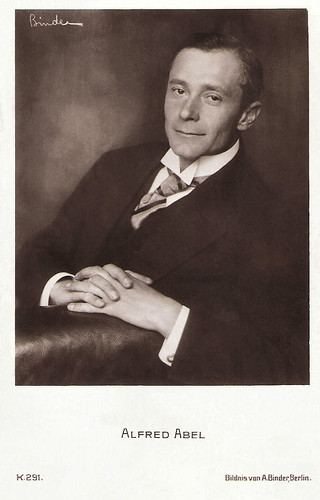
German postcard by Photochemie, Berlin, no. K. 291. Photo: Alex Binder.
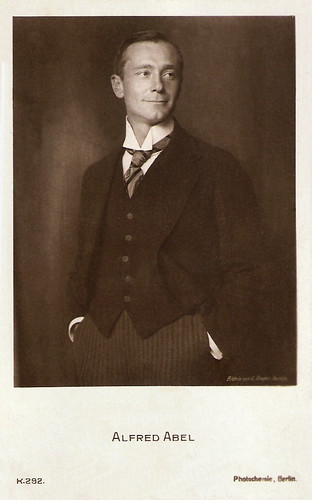
German postcard by Photochemie, Berlin, no. K. 292. Photo: Alex Binder.
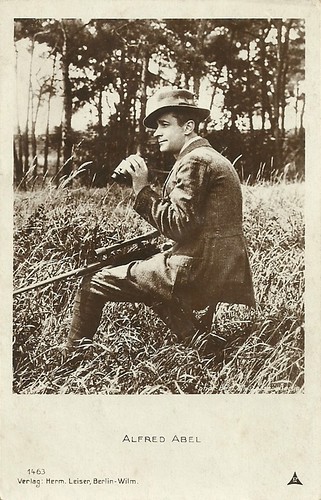
German postcard by Verlag Hermann Leiser, no. 1463. Photo: Berliner Illustrierte, Berlin.
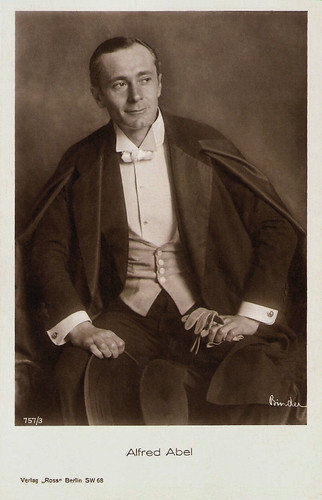
German postcard by Ross Verlag, Berlin, no. 757/3, 1919-1924. Photo: Alex Binder.

German collectors card by Ross Verlag in the series Vom Werden deutscher Filmkunst - Der Stumme Film, picture no. 83, group 40. Photo: Ufa. Pola Negri and Alfred Abel in Die Flamme/The Flame (Ernst Lubitsch, 1923).
Arrogant industrial
Alfred Peter Abel was born in Leipzig in the German Empire in 1879. He was the son of a travelling salesman, Louis Abel, and his wife, Anna Maria Selma. He studied to be a forester, a gardener and a businessman before he attended private acting classes.
After making his stage debut in Luzern (Lucerne), Switzerland, he moved to the Baranowsky Theater in Berlin under the direction of Max Reinhardt. He quickly gained fame and was called to do several other acting jobs. Abel garnered international success with his guest performance at the Irving Place Theatre in New York City. In 1904 he joined Max Reinhardt's Deutsches Theater in Berlin, where he stayed for the next ten years.
At age 33, he made his film debut in Eine venezianische Nacht/One Night in Venice (Max Reinhardt, 1913) opposite Maria Carmi. That was the start of an extensive career in German silent cinema. He played for genius directors such as Ernst Lubitsch, Friedrich Wilhelm Murnau, and Fritz Lang, and appeared opposite the great stars of the Weimar cinema: Asta Nielsen, Henny Porten and Pola Negri.
Memorable are his performances in such films as Der brennende Acker/Burning Soil (Friedrich Wilhelm Murnau, 1922) with Lya de Putti, Phantom/The Phantom (Friedrich Wilhelm Murnau, 1922) with Lil Dagover, and Die Finanzen des Grosshertogs/The Grand Duke's Finances (Friedrich Wilhelm Murnau, 1923), Dr. Mabuse der Spieler/Dr. Mabuse, the Gambler (Fritz Lang, 1922) with Rudolf Klein-Rogge, Die Flamme/The Flame (Ernst Lubitsch, 1922) starring Pola Negri, and Marcel L'Herbier's film adaptation of Emile Zola's L'Argent/The Money (1928).
In particular his role as the arrogant industrial Joh. Fredersen in the SF-classic Metropolis (Fritz Lang, 1926) is unforgettable. As Fredersen, he was the leader of the metropolis.
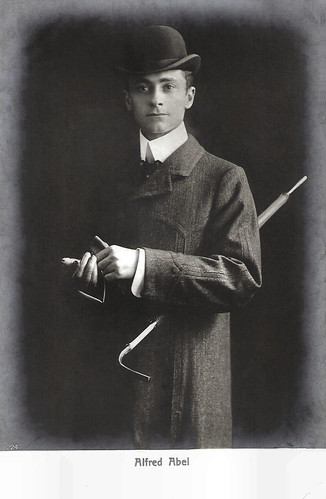
German postcard, no. 224.
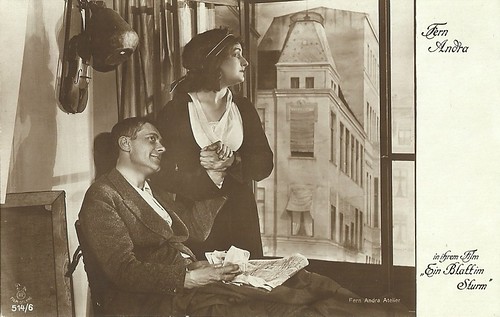
German postcard in the Film-Sterne series by Rotophot, no. 514/6. Photo: Fern Andra Atelier. Fern Andra and Alfred Abel in the German silent film Ein Blatt im Sturm ... doch das Schicksal hat es verweht (n.n., 1917).

German postcard by Rotophot / Verlag Ross, Berlin, no. 570/2. Photo: Messter-Film, Berlin. Henny Porten and Alfred Abel in Die Dame, der Teufel und die Probiermamsell/The Lady, the Devil and the Model (Rudolf Biebrach, 1918).

German postcard by Ross Verlag, no. 614/1. Photo: Union. Asta Nielsen and Alfred Abel in Rausch/Intoxication (Ernst Lubitsch, 1919).

German postcard by Ross Verlag, no. 647/9. Photo: Karl Schenker. Caption: Alfred Abel as 'Voltaire, the genial friend of Frederick [the Great]'. NB Alfred Abel is not listed as playing Voltaire in any of the Frederick the Great films, but the back of this postcard states this is for the Fridericus Rex series (1922-1923) by Arzén von Cserépy for Cserepy Film Co.
Cropped-up emotions and tensions
Alfred Abel was known for his restrained performances, expressing cropped-up emotions and tensions, quite contrary to stage acting. Although he was a trained stage actor, he understood well that film acting was something different. When the sound film came in, Abel easily switched to talking roles.
During the sound era, he played in films by Detlef Sierck (aka Douglas Sirk), Paul Martin, Reinhold Schünzel and Anatole Litvak.
Among his most popular sound films were Dolly macht Karriere/Dolly’s Way to Stardom (Anatole Litvak, 1930) with Dolly Haas, Meine, Frau, die Hochstaplerin/My Wife the Confidence Trickster (Kurt Gerron, 1931) and the classic film operetta Der Kongress tanzt/The Congress Dances (Erik Charell, 1931) starring Lilian Harvey and Willy Fritsch.
Abel also played the lead in Mary (1931), the German version of Alfred Hitchcock's Murder (1930). Hitchcock later told François Truffaut in his book 'Hitchcock on Hitchcock' that Mary featured 'things we did for the first time': stream of consciousness, play in the play a la 'Hamlet', references to transvestism and even hints at (veiled) homosexuality, which was a 'crime' in Great Britain as it was in Germany at the time.

Yugoslavian postcard by Jos. Caklovic, Zagreb, no. 37. Photo: Balkan Film, Zagreb. Alfred Abel in Die Finanzen des Großherzogs (F. W. Murnau, 1924). Collection: Didier Hanson.

German postcard by Ross Verlag, Berlin, no. 812/1, 1925-1926. Photo: Ufa. Alfred Abel and Mady Christians in Mensch gegen Mensch/Man against Man (Hans Steinhoff, 1924).

German postcard by Ross Verlag, Berlin, no. 71/5. Photo: Ufa. Brigitte Helm, Rudolf Klein-Rogge and Alfred Abel in Metropolis (Fritz Lang, 1927).
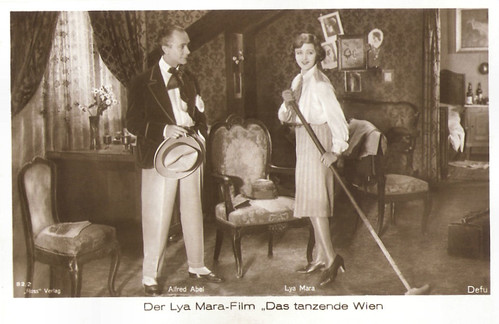
German postcard by Ross Verlag, no. 82/2. Photo: Defu. Publicity still for Das tanzende Wien/Dancing Vienna (Friedrich Zelnik, 1927) with Lya Mara.

Former Kingdom of Yugoslavia (Croatian) postcard by Ed. Jos Caklovic. Photo: Pan-Film, Zagreb. Alfred Abel in the German film Der Gardeoffizier/The Guardsman (Robert Wiene, 1927), based on the play 'A testör' by Ferenc Molnár.
Aryan heritage
Alfred Abel had a reputation in Berlin to be one of the best-dressed men and he gladly gave his opinion about fashion. He became more restricted to the role type of elegant, intelligent gentlemen and aristocrats and he tried to counterbalance this with satirical gestures, for instance, in Hofkonzert/The Court Concert (Detlev Sierck, 1936) with Marta Eggerth.
In the early 1920s, Abel tried film direction and created the production company Artifex Film. His directorial debut Der Streik der Diebe/The Strike of the Thieves (Alfred Abel, 1921) flopped, but in 1929 he tried it again with Narkose/Narcosis (Alfred Abel, 1929).
This was followed by Glückliche Reise/Bon Voyage (Alfred Abel, 1933) with Magda Schneider and Alles um eine Frau/Everything for a Woman (Alfred Abel, 1935) starring Gustav Diessl.
Abel was married to Elizabeth Seidel with whom he had one daughter actress Ursula Abel. In 1935, the Nazi regime prohibited Ursula from appearing in subsequent films after she failed to produce ancestry papers (Ariernachweis) for her father to prove he was not of Jewish descent.
After battling a long illness, Alfred Abel died in 1937 in Berlin. Abel’s final film role was as Daffinger in Frau Sylvelin (Herbert Maisch, 1938), which was not released until after his death.
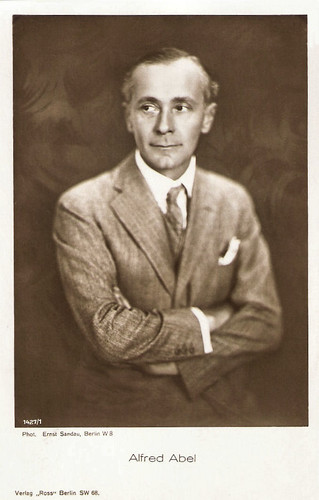
German postcard by Ross Verlag, Berlin, no. 1427/1, 1927-1928. Photo: Ernst Sandau.
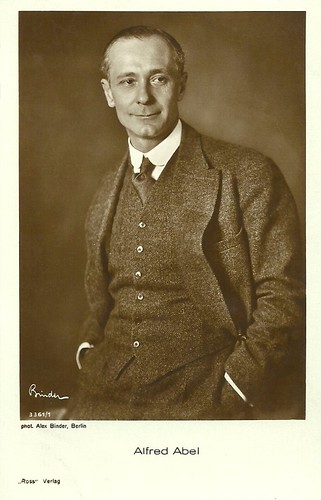
German postcard by Ross Verlag, no. 3161/1, 1928-1929. Photo: Alex Binder.
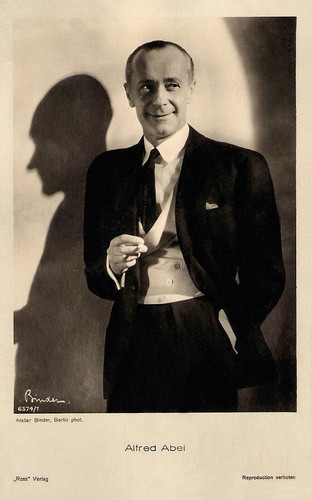
German postcard by Ross Verlag, no. 6574/1, 1931-1932. Photo: Atelier Binder, Berlin.

German postcard by Margarinewerk Eidelstedt Gebr. Fauser G.m.b.H., Holstein, Serie 1, no. Bild 16. Photo: Marcus.
Great scene from Phantom (F.W. Murnau, 1922). Source: Blowskiol (YouTube).
Sources: Thomas Staedeli (Cyranos), Stephanie D'heil (Steffi-line) (German), Filmportal.de, Wikipedia, and IMDb.
This post was last updated on 9 April 2022.
Wonderful post Bob.
ReplyDeleteThat scene from "Phantom" is amazing.
German cinema of this period is fascinating; on so many levels.
Thank you for sharing this.
Thanks. I am a big fan of F.W. Murnau, and in my opinion Phantom is one of his masterpieces. Because of the inventive camera work but also because of the fine performance of Alfred Abel.
ReplyDelete